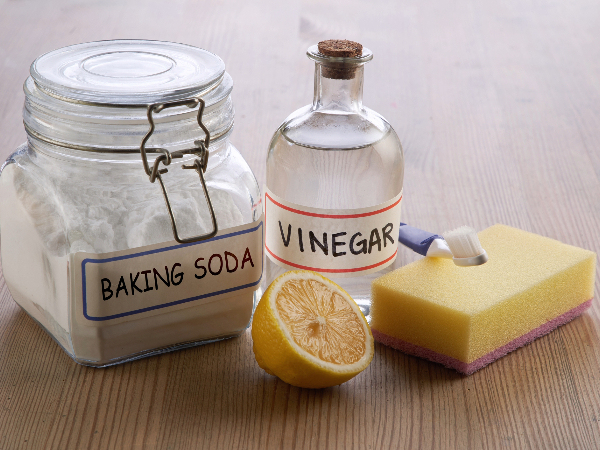
Want to be greener as you clean, but need help figuring out where to begin? Here are seven tips to get you on your way!
- Think mechanical first. A scrub brush, a dish scrubber, and a retired toothbrush can provide a lot of cleaning power with no chemicals at all. Use drain baskets to keep drains free of debris that can lead to clogs.
- Use up chemicals that you have on hand before purchasing more. If you have cleaners stored in multiple locations (some in the laundry room, others under the kitchen sink, and a few in the garage), find them and inventory what you have available.
- Consider creating your own cleaners from common household products, such as vinegar, baking soda, salt, lemon juice, and mineral oil. Many of these cleaners are easy to make, effective, and less expensive than pre-mixed chemical solutions. Recipes for homemade cleaning supplies abound on the internet; search online to find the ones that work best for you. Here are some examples to try. (Remember that even homemade cleaners can irritate the skin and eyes. Always use caution in mixing, storing, and using homemade cleaners.)
- If you choose to purchase a cleaning product, choose the mildest and most benign chemical product available. Don’t use a sledgehammer when a fly swatter will do. Try to select products that provide complete information on ingredients, offer the most precise instructions, and don’t require special safety measures for use or disposal. To help you identify these products, search the EPA’s Safer Choice website.
- When you purchase products or containers, look for recycled-content and recyclable containers. Rather than using paper towels, choose reusable towels and old rags. If you buy paper towels, opt for those made from recycled-content paper.
- Buy concentrates to reduce packaging waste. Some cleaning products are now sold in concentrated form; you finish making the solution by adding tap water at home. Other products, such as laundry detergent, are concentrated and ready to use when you get home. Remember — you can use even less detergent if you have softened water.
- Deep cleaning products in their original, labeled containers and dispose of them properly. Never pour potentially harmful chemicals into food or beverage containers for storage. Store all cleaning products out of reach of children and away from pets. Do not store potentially hazardous materials near heat sources or in direct sunlight. Contact your local solid waste authority for instructions on properly disposing of unneeded household hazardous waste in your community and check out Be Safe with Your Hazardous Waste.
Image credit: new look casting | iStock | Getty Images Plus
